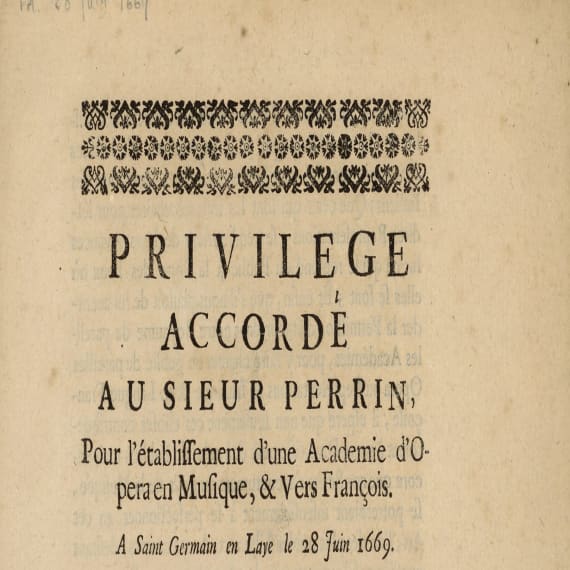Prices
Show / Event
Venue
Experience
No result. Clear filters or select a larger calendar range.
No show today.
© BnF

II. The inventors of French opera
To counter the Italian influence prevailing at the Court, the poet Pierre Perrin and musician Robert Cambert joined forces to compose La Pastorale d’Issy in 1659, “the first French play set to music to be staged in France”.
To counter the Italian influence prevailing at the Court, the poet Pierre Perrin and musician Robert Cambert joined forces to compose La Pastorale d’Issy in 1659, “the first French play set to music to be staged in France”. Subsequently performed before the King and Queen, it also so captivated Mazarin that he urged the two composers to write an opera in French. The Cardinal’s death in 1661, followed by Cavalli’s departure in 1662, freed Perrin up to progress, from 1667, in his plans to set up a “poetry and music academy”. These finally became a reality on 28 June 1669 when Louis XIV bestowed upon Perrin a “privilege” to found the first opera academy in France.
The new academy had a monopoly on performances sung in Paris and across other towns of the Kingdom, with the exception of the Court; the privilege ran for 12 years and its holder was permitted to collect revenue to compensate for the expenses incurred in producing the stage machinery, costumes and sets.
Hardly had the adventure of French opera got under way though, than Perrin found himself imprisoned for debt, and was unable to attend the staging of his first opera, Pomone, in 1671. The following year, the scheming Lully bought his privilege from him and renamed the Opera “Royal Academy of Music”.
By partnering up with Quinault for the literary quality of the libretti, Beauchamps for the gracefulness of the ballets and Vigarani for the splendour of the set design, Lully invented, with Cadmus et Hermione (1673), the tragédie en musique, a specifically French genre of opera destined to become hugely popular.














